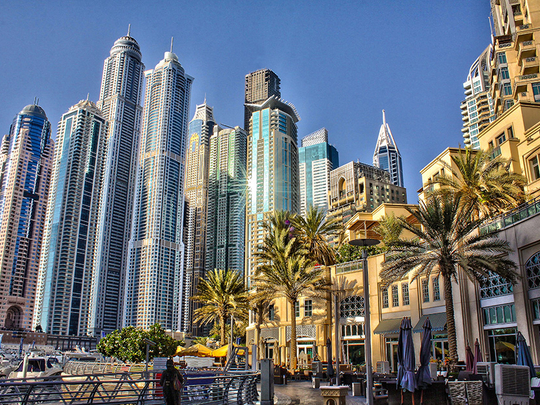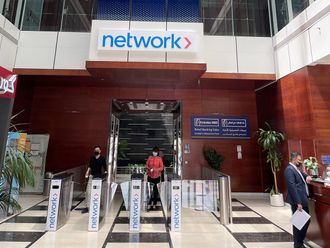
Now could be a great time to buy a property in Dubai. For potential investors, there are more properties to choose from, demand is lower, and so are prices. The problem for those that don't have a few million dirhams available is how to pay for it.
The dirham's peg to the dollar, which has been getting stronger against currencies like the euro and the Russian rouble, is making it more expensive for investors from those countries to buy real estate in the UAE, so competition among buyers is falling. Prices are also falling, and are expected to keep dropping throughout this year.
"2016 is expected to see more challenging conditions in the UAE real estate market as we begin to feel the impact of the continuing fall in oil prices and ongoing geopolitical tensions leading to reduced liquidity, and pressure on government budgets,” says Alan Robertson, MENA CEO of real estate consultancy JLL.
Residential prices in Dubai dropped around 15 per cent last year and rents softened as demand waned, according to a report by Phidar Advisory released last month. Prices are expected to continue to fall this year, particularly as low oil prices sap investor confidence.
Although in 2015 the value of property sales in Dubai rose by 8 percent to more than Dh267 billion, according to the Dubai Land Department, more recent figures show that sales fell nearly 25 per cent in January, compared to the previous month. Mortgage deals dropped by about 31 pe rcent.
For investors that are not able to finance a property in cash, buying may be about to become more difficult.
The first increase in US interest rates since 2006 in December has been followed by the Central Bank of the UAE as a result of the dirham’s peg to the dollar. Tightening liquidity in the local banking sector as a result of the drop in oil prices and a slowdown in economic growth will also put some upward pressure on interest rates that borrowers can expect to pay.
Bankers say the increase in rates is modest so far and they are still a long way below the 7 per cent average of home finance loans in 2007-08. That means that for existing mortgage customers the increase in mortgage payments is minimal so far and should not yet be a cause for concern.
Banks are offering favourable rates with the option to lock-in fixed rates now for several years, so those that can afford the initial deposit can still get a good deal on a mortgage before rates rise any further.
Mortgages are still an attractive product for banks too, and competition among lenders will likely mean that interest rates on home finance loans do not rise too quickly. National Bank of Abu Dhabi CEO Alex Thursby named its domestic mortgage business as one of the areas it would focus on this year instead of conventional lending as it copes with the fall in liquidity. Generally, the portion of mortgage transactions as a percentage of total real estate deals has been rising over the past few years.
It is an area that holds lots of potential as developers increasingly focus on building for middle-income customers. But the cap on mortgages introduced at the end of 2013 is still making it difficult for people renting in the UAE to buy their own home, even as demand shifts from being led by investors, who have typically financed property purchases with cash, to end-users who often need bank loans to buy a home.
Real estate consultancy JLL recently said in a report that middle-income families, which it said make up about 39 per cent of the population and earn between Dh10,000 to Dh30,000 a month, would only be able to afford to purchase property up to Dh790,000. Even that would require a deposit of about AED160,000 to even apply for a mortgage under the current rules limiting mortgages for expatriates at 80 pe rcent of a property's value.
Dubai-based Souqalmal.com, a consumer website that allows users to compare financial products like home loans or credit cards, said in a recent report that it had registered a 36 per cent rise in user interest in home loans. According to the website’s research, customers need to earn a minimum of Dh20,000 a month to be eligible for most home loans offered in the UAE and most offer interest rates starting at between 3-4 per cent.
According to the website some banks, including HSBC and Standard Chartered, have already increased rates as a result of the US raising rates and more are expected to follow. How that affects demand for new mortgages will only become clear later in the year, but further hikes in interest rates are likely before the end of 2016.
Increasingly developers are targeting end-users rather than speculators, and getting around the mortgage caps by offering their own payment plans on properties still under construction that allow for smaller down-payments.
With prices likely to remain soft over the next 12 months, those interested in buying will inevitably be tempted to put it off and wait for a better deal. But the prospect of higher mortgage rates means they could be well advised to take the plunger sooner rather than later.










